It might seem like the science linking cholesterol to heart attacks is solid. It might…
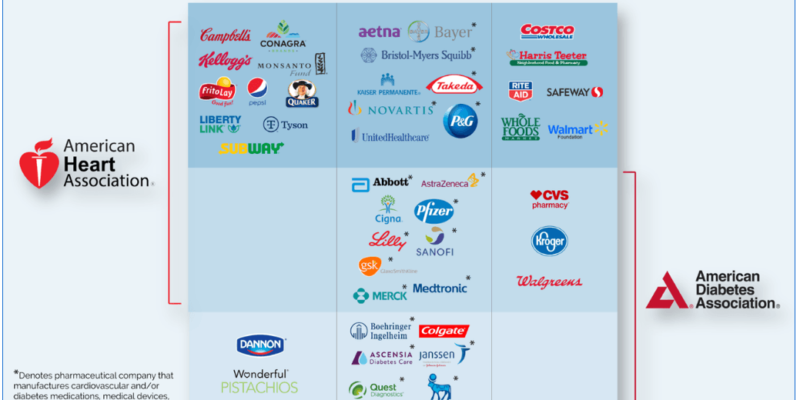
Cholesterol: What the American Heart Association is Hiding from You (Part 2)
Table of Contents
- Historically, A Human Diet is Not Low Cholesterol
- Ancel Keys’ First Tactic was to Blind Doctors With Science
- Keys Helped Design a Study to Test the Effects of a High-PUFA Diet
- The Minnesota Coronary Experiment Stacked the Dietary Deck in Favor of PUFA
- The BIG Question: Does a High-PUFA, Cholesterol-Lowering Diet Reduce Mortality?
- PUFAs Increase Mortality
This is the second in a series of three articles that explode the myth that cholesterol is the cause of heart disease. Today’s article will cover a dark period in scientific history that forever changed the course of human health and our relationship with food. My hope is this article will open everyone’s eyes to the reality that the American Heart Association—the organization that taught your doctor high LDL cholesterol in your blood causes heart attacks—has betrayed our trust by feeding us fake news in the form of shady science, and has been doing so for decades.
This article is continued below...(scroll down)
Today we’ll learn:
- The American Heart Association starting calling cholesterol bad when companies using vegetable oils started making donations.
- Vegetable oils are prone to oxidation, and promoting them has caused millions of deaths.
- The AHA failed to publish evidence of the harms of vegetable oil consumption in any of their dozen or so professional journals.
- This is scientific fraud.
- Doctors who don’t know the history of the cholesterol theory of heart disease are doing more harm than they know.
At a crisis point in my career, I was forced to consider the idea that my medical training included a dramatically deficient definition of a healthy human diet. This second in a series of articles reveals corporate relationships that have escaped scrutiny for decades, as they reveal powerful potential conflicts of interest motivating the men still celebrated as leaders in nutrition thought.
Historically, A Human Diet is Not Low Cholesterol
When your primary care doctor recommends cutting out foods like butter and eggs in favor of Smart Balance and egg beaters, or your naturopathic doctor tells you cow’s milk is unhealthy because of saturated fat and you’d be better off with rice milk, when your trainer tells you to eat skinless boneless chicken breast and protein powders, when your McDonald’s fries are soaked in seed oils instead of crisped with beef tallow like when I was a kid, and your take-out pizza is made with soy oil instead of olive oil, it’s important to realize that all these recommended changes are taking the freshness and realness of your diet down a notch or two—and some of these newer alternatives are outright toxic.
Nobody would want these lower-quality processed foods were it not for the idea that saturated fat and cholesterol clog your arteries. This idea has made us afraid of the very foods our bodies need the most, and it’s enabled the processed food industry to thrive as never before. The saturated fat lie helped to create a demand for alternative fats that come from soy, corn, and other subsidized monoculture crops soaked in pesticides and herbicides, destroying the soil and with it our ability to live sustainably off the land.
The myth that saturated fat and cholesterol clog arteries has acted like a virus, a contagious idea that infected humanity’s relationship with food and separated us from thousands of years of culinary tradition and farming wisdom. It has allowed for the painting of all animal products with one brush, as if how they’re fed and raised makes no difference, putting thousands of traditional family farms out of business. Instead of being raised by farmers who treat their animals like family, most cattle, pork, and poultry are now subjected to horrific treatment in industrial-scale agricultural operations. This is affecting farmers and people who love animals, certainly, but it also affects all of us because it means poultry, pork, and beef all taste worse and are far less nutritious.
This one idea, that saturated fat, and cholesterol cause heart disease has gradually turned us against nature, the source of human health. To really get comfortable with the fact that cholesterol is not your enemy and vegetable oils are, it’s helpful to understand the history of this idea.
Its origins can be traced back to an influential figure in the American Heart Association, named Ancel Keys.
Ancel Keys’ Sold the American Heart Association’s Soul for $1.7 Million
As I wrote in Chapter 7 of Deep Nutrition, called Good Fats and Bad, it all began back in the 1950s and 1960s when an oceanographer and eel physiologist named Ancel Keys designed a series of highly influential experiments that forever altered the course of American dietary history. Keys had a powerful personality, which he used to influence the American Heart Association leadership. As a result, a deal was brokered where Proctor & Gamble, makers of hydrogenated vegetable oil, paid the AHA 1.7 million dollars.
Before Keys, Americans enjoyed traditional foods like butter, eggs, and bacon without worrying about their health. After Ancel Keys made the cover of Time Magazine on Jan 13, 1961, the American public was introduced to the idea that saturated fats were clogging their arteries. That idea ultimately led to a sea change in the foods we eat. Real fats would increasingly be replaced by factory-made seed oils, and the era of chronic disease would begin.
This article extends the arguments I made in Deep Nutrition to show how Keys and his allies misled doctors and hid the results of their own studies that would have proved them wrong.
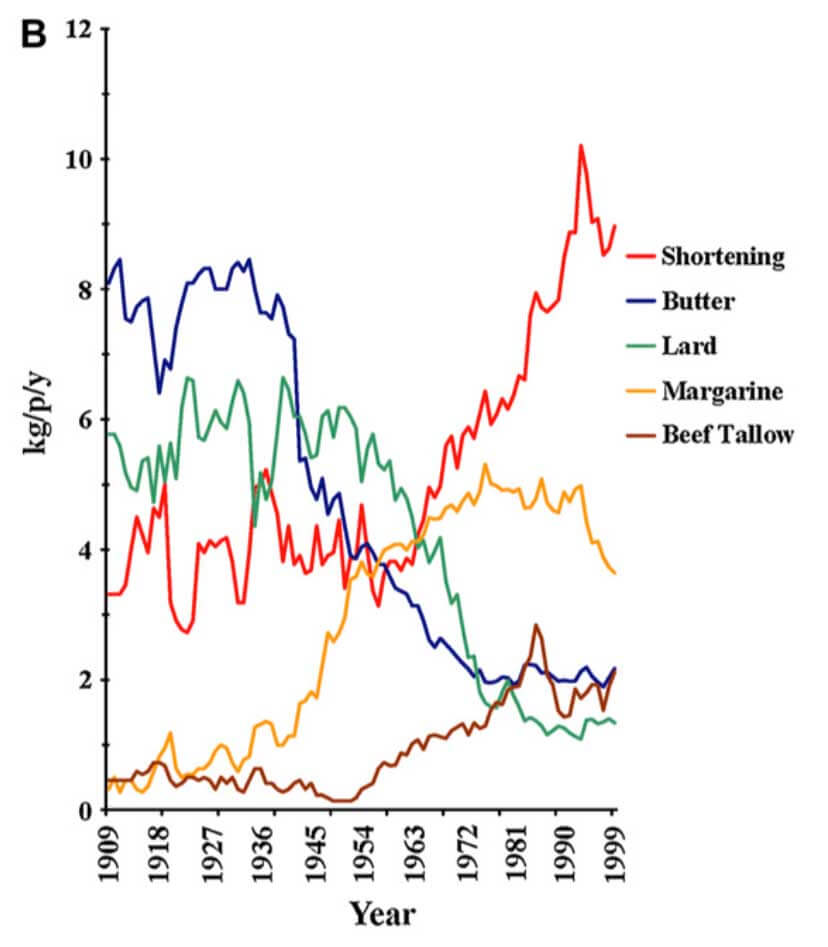
Ancel Keys’ First Tactic was to Blind Doctors With Science
In the 1961 Time magazine article celebrating Keys, he is quoted as warning us that “Americans eat too much fat. With meat, milk, butter, and ice cream, the calorie-heavy U.S. diet is 40% fat, and most of that is saturated fat—the insidious kind…that increases blood cholesterol, damages arteries, and leads to coronary disease.”
During interviews like these where Ancel Keys discussed his research and experiments, he led the audience to believe that saturated fat from butter and eggs caused atherosclerosis. But during those interviews, he was not completely honest. Had he been, he would have said that his studies showed margarine caused atherosclerosis. The margarine in his experiments contained saturated fats that had been artificially created from vegetable oils using a process called hydrogenation. Hydrogenated vegetable oils contain not just saturated fat but also trans fat and a whole host of other unnatural molecules. Trans fat is now known to have a multitude of toxic effects on the body, causing fatty liver, weight gain, as well as lead to heart attacks and stroke. It’s so unhealthy that cities like Manhattan and San Francisco have outlawed its use in restaurants.
Keys fooled the best doctors of his time using the term “hydrogenated fats.” He rightly guessed nobody would bother to look up either his research or the meaning of the word. 60 years later, most doctors are still confused.
Keys didn’t have to work very hard to hide this deception. One publication he authored entitled “Hydrogenated fats in the diet and lipids in the serum of man” should have been a red flag that he was not using real food in his experiments. But few recognized it as a red flag because few were conversant with the terms he was using. Although doctors do learn some biochemistry, food-processing terms like hydrogenation would not become part of the standard curriculum until 50 years after Keys, nearly a century after they were introduced into the food supply.
Ancel Keys also played games with statistics. Most notoriously, he cherry-picked data points that made it look like countries that ate the most fat also had the most heart attacks. In other words, he excluded countries that ate a lot of fat but had few heart attack deaths and vice versa. The details of this historic deception have been covered by many researchers including Dr. Uffe Ravnskoff, Dr. Malcolm Kendrick, journalist Nina Teicholz, and myself.
What’s less well known is that Ancel Keys also compiled smoking data starting in 1958 at the beginning of the Seven Country’s Study, but he failed to publish the smoking data until 1980, well after he had successfully deluded Americans into believing saturated fat clogged arteries.
Keys was the first person to collect large amounts of data on the relationship between smoking and heart attacks. But Keys never talked about the smoking data he collected, and the obvious and powerful correlation between cigarette smoking and heart attacks wasn’t published until many years after the initial data was collected.
But by then, it was too late. The saturated-fat cat was out of the bag and nobody in any position of authority was willing or able to put it back in. The belief that saturated fat is unhealthy because it elevates the cholesterol, which supposedly clogs our arteries and causes heart attacks and strokes, now forms the basic foundation of most nutrition science in spite of the fact that it was based on a series of deceptions and scientific half-truths.
Fortunately, blockbuster books like Good Calories, Bad Calories, The Big Fat Surprise, and The Primal Blueprint, as well as my own books, have gone a long way towards informing the reading public on the health harms of hydrogenated vegetable oils, and the lack of harm from natural saturated fat. This information has trickled down to influence the thinking of some doctors as well, and a few have lifted their restrictions on butter and eggs.
But Keys did more than fool physicians into believing eating butter and eggs would kill us.
Keys also convinced doctors in the AHA to accept funding from companies selling vegetable oil-based shortening.
Ancel Keys was a leader within the American Heart Association and a close friend of one of the organization’s founders, Paul Dudley White, MD. Dr. White famously treated President Eisenhauer after his first of several heart attacks. At first, Dr. White was not in step with Keys about the idea that saturated fat causes heart attacks, but soon after they met he changed his opinion. That flip-flop was perhaps an outgrowth of the need for corporate sponsorships for the American Heart Association, which Dr. White directed for several years.
As Nina Teicholz writes in The Wall Street Journal, “In 1948, P&G made the AHA the beneficiary of the popular ‘Walking Man’ radio contest, which the company sponsored. The show raised $1.7 million for the group and transformed it (according to the AHA’s official history) from a small, underfunded professional society into the powerhouse that it remains today.”
It’s possible that Ancel Keys brokered the deal, but that is a question that for now remains unanswered [Authors note: In 2022, I discovered the true origin of this relationship and write about that in my book Dark Calories]. The fact is, the AHA was clearly in bed with the biggest vegetable-oil company in the world at the time and Keys’ linguistic tricks and statistical deceptions made Procter & Gamble’s product look healthier than their only competition at the time, the traditional fats like butter, tallow, and lard. It’s entirely possible that Keys at one point in his career truly believed that traditional fats like butter, tallow, and lard caused heart attacks. But once his reputation became dependent on the idea, he crossed a line. The next section discusses what I think is the worst example of how Ancel Keys’ and the AHA’s medical leadership worked together in an attempt to make vegetable oil look healthy.
Medical investigators discovered data the Keys and his collaborators never published. This data would have changed the course of world dietary history had Keys shared it.
Keys Helped Design a Study to Test the Effects of a High-PUFA Diet
In the 1960s, Ancel Keys and the president of the Minnesota chapter of the AHA, Dr. Ivan Frantz, designed one of the largest, most rigorous experiments ever conducted to test an important question: how do vegetable oils affect our health. Called The Minnesota Coronary Experiment (MCE), it was the highest-quality kind of study, a double-blind randomized controlled trial. And it was huge, a massive undertaking involving thousands of adult residents of six state mental hospitals and one nursing home, where inmates had no choice but to eat what was put in front of them and so compliance with the experimental diets was practically guaranteed. Everything was done to assure the that results were going to be as reliable and meaningful as possible.
The study was composed of two parts, designed to test the validity of two different hypotheses:
- That a diet high in polyunsaturated fat from vegetable oils would lower cholesterol.
- That this reduction in cholesterol levels would prevent atherosclerosis and deaths from a heart attack and stroke.
Both hypotheses are important, but number two is even more important because if PUFAs do in fact lower cholesterol but this fails to translate to a reduction in heart attacks and strokes, this challenges the idea that cholesterol is the cause of heart attacks.
To test the two hypotheses, the study subjects were divided into two groups and fed two different diets for at least a year. One diet, called the control, was intended to mimic the typical American’s diet and was relatively high in saturated fat. The other, called the experimental diet, was low in saturated fat and high in polyunsaturated fat from corn oil.
The Minnesota Coronary Experiment Stacked the Dietary Deck in Favor of PUFA
The experimental, high polyunsaturated-fat diet contained lean meats “filled” with vegetable oil (called “filled meats”), skim milk, and cheeses to which corn or other vegetable oils were added, along with some margarine—no butter or natural animal fats. But the so-called control diet was not exactly what most Americans at the time would eat. Rather than containing butter and animal fats, it was full of margarine and shortening as these are also rich sources of saturated fats.
What’s key here is that this so-called control diet contained substantial quantities of trans fat. In other words, the experimental diet was being compared to a very unhealthy diet, not a true control. What was in fact being examined was not the effect of saturated fat versus PUFA but, rather, the effect of trans fat plus saturated fat from hydrogenated oils versus PUFA. By comparing PUFA to unnatural factory foods, Keys stacked the deck in favor of PUFA. Given that Ancel lKeys had been studying trans fat’s effects for years before this study started, I doubt this little cheat was accidental.
Even with this deck stacking, real science would make an appearance in the form of meaningful results that were not what the researchers were hoping to see.
Part 1, Question 1) Do PUFAs Lower Cholesterol?
Answer: Yes!
Both the control and study groups had their cholesterol levels tested at the onset of their participation in the study and again one year later. In the beginning, the numbers were very well-matched and nearly identical. One year later, the high-PUFA diet group had cholesterol levels 30 points lower, on average, than those in the so-called control group. This was not an entirely new finding since many other less well-designed studies and animal experiments had already demonstrated that PUFAs reduce cholesterol.
It’s important to know that this predictable reduction in cholesterol is the American Heart Association’s justification for recommending vegetable oils. That’s why products like Smart Balance and thousands of other high-PUFA products claim to be “heart-healthy.”
But here’s the problem: we’ve never shown that lowering cholesterol by eating more PUFAs prevents heart attacks. That’s the question that part 2 of the study was designed to test.
Part 2, Question 2) Do PUFAs Prevent Heart Attacks?
Answer: Inconclusive.
Both groups were followed for an average of 3 1/2 years, or until their deaths. Participants needed to have been on the diet for at least one year before death for the result to be counted. Upon dying, an autopsy was performed to determine the cause of death. While they gathered all the data that would have answered the second question, and almost certainly were aware of what it showed, they simply never published it. Fortunately, the lead scientist, Dr. Frantz, left most of the data, some 2355 medical charts, and 149 completed autopsy files crammed into dusty boxes, undisturbed in his basement.
Some 30 years later, Christopher E. Ramsden, described as the Indiana Jones of medical research, gained access to what remained of the raw data. Most of it was there, but many of the autopsy reports necessary to determine the cause of death were missing. That meant the remaining data couldn’t definitively answer the question about heart attacks. But there was enough data to determine how many people in each group died, which is a very important question.
The BIG Question: Does a High-PUFA, Cholesterol-Lowering Diet Reduce Mortality?
Answer:
No.
That’s kind of the point, right? Not dying? Even if the diet reduces deaths from heart attacks, if it increases deaths from other conditions, we’d need to know that before making any recommendations to include PUFAs in our diet. So the mortality question is the BIG question that needs to be addressed.
As Dr. Ramsden writes in his landmark article Re-evaluation of the traditional diet-heart hypothesis: analysis of recovered data from Minnesota Coronary Experiment (1968-73). “The number, proportion, and probability of death increased as serum cholesterol decreased.” In other words, the more a person’s cholesterol dropped, the more likely they were to die. For each 30 mg/dL reduction in serum cholesterol, the risk of death increased by 22%. Ramsden said in an interview that “[w]e were able to find that actually those that lowered their cholesterol more actually had increased rather than reduced risk of death,” adding, “It was surprising.”
If this data is valid, it’s more than a surprise. It’s kind of a big deal. Actually, it’s an outrageously big deal. Why wasn’t this information published as soon as it was available? According to the lead author’s son (interviewed by Malcolm Gladwell for a podcast called The Basement Files), these results were so shocking to Dr. Frantz, he didn’t know what to make of it all and simply “couldn’t bring himself to publish them.”
Some suggest we should let these guys off the hook, rationalizing that it wasn’t self-interest holding them back; it was self-doubt. It’s human nature for researchers to doubt their results when the results are unexpected.
But I’m not making excuses for these two icons of nutrition science whose careers would have been dramatically altered by results that proved them wrong. I see people daily, whose lives have been forever changed by diseases brought on by the consumption of the very seed oils the AHA taught your doctor to promote. These so-called heroes of nutrition science may have had some interest in the subject, but I reckon they were also interested in money. By failing to show their results, that PUFAs kill people more often than deadly trans fat, they protected the American Heart Association’s chief source of funding, which was at that time the seed oil industry.
PUFAs Increase Mortality
This chart from the 2016 BMJ article by Ramsden et al shows that folks over age 65 eating the high-PUFA diet (blue line) died more often than folks eating the so-called control diet (red line). For those under age 65, the effect is lessened and appears to favor PUFA. But before you wonder whether PUFA might be healthier than saturated fat for folks under 65, remember the deck was stacked in favor of PUFA by loading up the control diet with toxic trans fat. So what we may really be seeing is that before age 65, there’s a sex difference such that for women PUFAs cause more deaths than trans fat before age 65, and after age 65 PUFAs cause more deaths than trans fat for both sexes.
Keep in mind, the differences shown in the mortality rates of women and men and women over sixty-five are significant enough that any drug that could effectively address the effects of PUFA would be a blockbuster.
The AHA Is Giving Us Unhealthy Advice, and Harvard Doesn’t Care
Perhaps the most influential person in the nutrition world today, Dr. Walter Willet—who has a school at Harvard named after him—has called Ramsden’s study “an interesting historical footnote that has no relevance to current dietary recommendations.”
Here’s why Dr. Willet is wrong about the study’s relevance.
- The AHA ignores contradictory evidence like this at our peril. As Ramsden suggests, the AHA has been ignoring similar evidence for a long time, and “Recovery of unpublished data can alter the balance of evidence and, in some instances, can lead to a reversal of established policy or clinical practice positions.”
- The AHA still recommends “<10% of calories from saturated fats. Replace with unsaturated fat, particularly PUFA.”
- The Average American is following the AHA’s advice on fatty acids (whether they know it or not), and is now eating a diet very similar to the Minnesota Coronary Experiment’s experimental diet in terms of its fatty acid profile. Here’s my evidence:
- The MCE study diet limited saturated fat to between 8.0% to 12.3% of calories and today’s guidelines recommend limiting saturated fat to 10% of calories.
- The MCE study diet’s linoleic acid levels ranged from about 11.3% to 16.5% of calories, and today’s linoleic acid intake is probably very similar. (In 1999, this study cites linoleic acid consumption at 7% of daily calories, and that PUFA consumption has nearly doubled between then and now).
- Not only did Ramsden’s study show that the diet the AHA has most of us eating fails to reduce mortality, it actually increases mortality compared to the study’s control.
- The so-called control was radically unhealthy due to its inclusion of trans fat—now accepted by the AHA to be deadly—and yet the high-PUFA diet proved either to be equally deadly or, in the case of women and seniors, notably more deadly, suggesting the AHA’s current dietary guidelines are radically unhealthy.
- Ramsden writes, “[i]t is clear from the MCE grant proposal that common margarines and shortenings (major sources of trans fat) were important components of the baseline hospital diets and the control diet (but not the intervention [high-PUFA] diet).”
- The diet the AHA has us eating may actually cause heart attacks in spite of its cholesterol-lowering effect.
- Ramsden et al point out (in the discussion section of the BMJ publication) PUFAs probably lower cholesterol because they cause “lipoprotein particle oxidation that could plausibly increase risk of coronary heart disease.”
- I’ve been warning my readers that LDL particle oxidation causes heart attacks for years, so I’m glad to see that an MD at the Lipid Peroxidation Unit of the NIH also thinks the same way. (See Chapter 7 of the 2017 Deep Nutrition entitled Good Fats and Bad.)
- The willingness of the AHA to ignore evidence that contradicts their theories on the cause of heart disease calls to question the very idea that LDL cholesterol is inherently “bad.”
Thousands of doctors across the country look at their patients’ cholesterol numbers every day and advise dietary changes and metabolism altering statin drugs based on a theory that would appear to have been proven wrong by this study. Harvard calls that an irrelevant footnote. I call it a strong indication that the American Heart Association is not looking out for your health.

Does High Cholesterol Even Matter?
It’s not often discussed, but there are decades of high-quality studies showing that death by cancer, pneumonia and other infections, and dementia are more common among folks with lower cholesterol, while high cholesterol is protective against death from these conditions.
The idea that there’s such a thing as bad cholesterol is a fiction manufactured to manipulate consumer behavior, nothing more. In fact, the evidence suggests that, if anything, on a seed oil free diet, higher HDL and LDL are protective against cancer and infection—including covid.
In part three of this series, you’ll hear the extraordinary tale of how the AHA’s advice to load up on vegetable oils worked synergistically with their mid-century message to keep on smoking as much as you want.
Please note: Please do not share personal medical information in a comment on our posts. It will be deleted due to HIPAA regulations.
This Post Has 7 Comments
Note: Please do not share personal information with a medical question in our comment section. Comments containing this content will be deleted due to HIPAA regulations.
















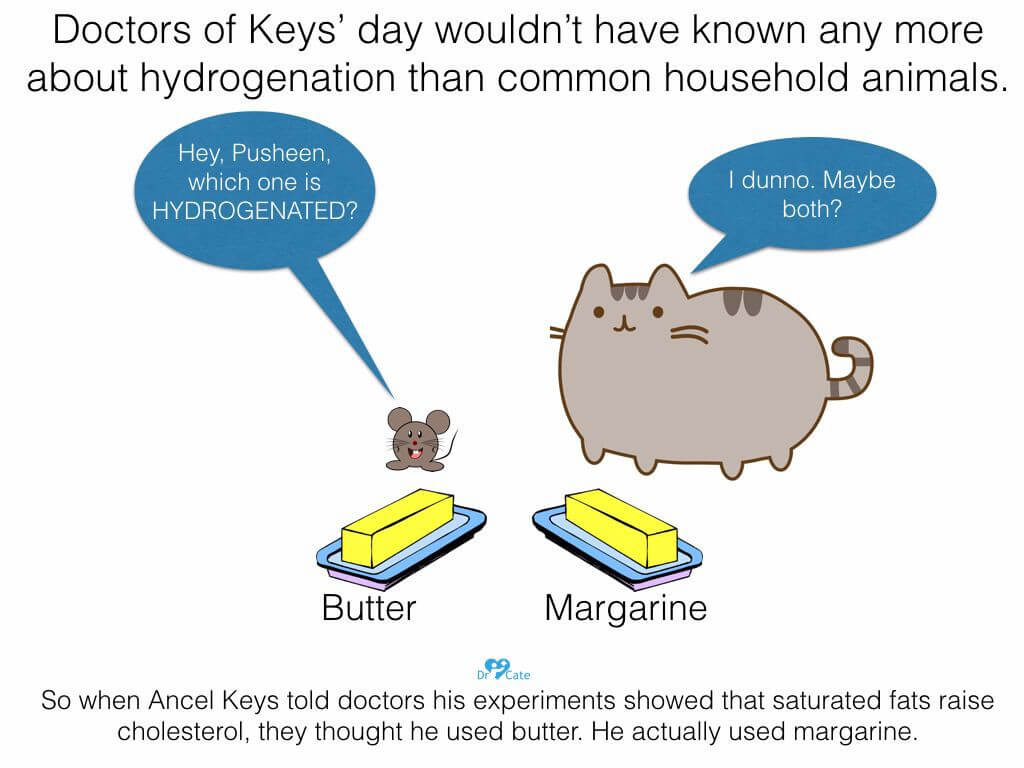
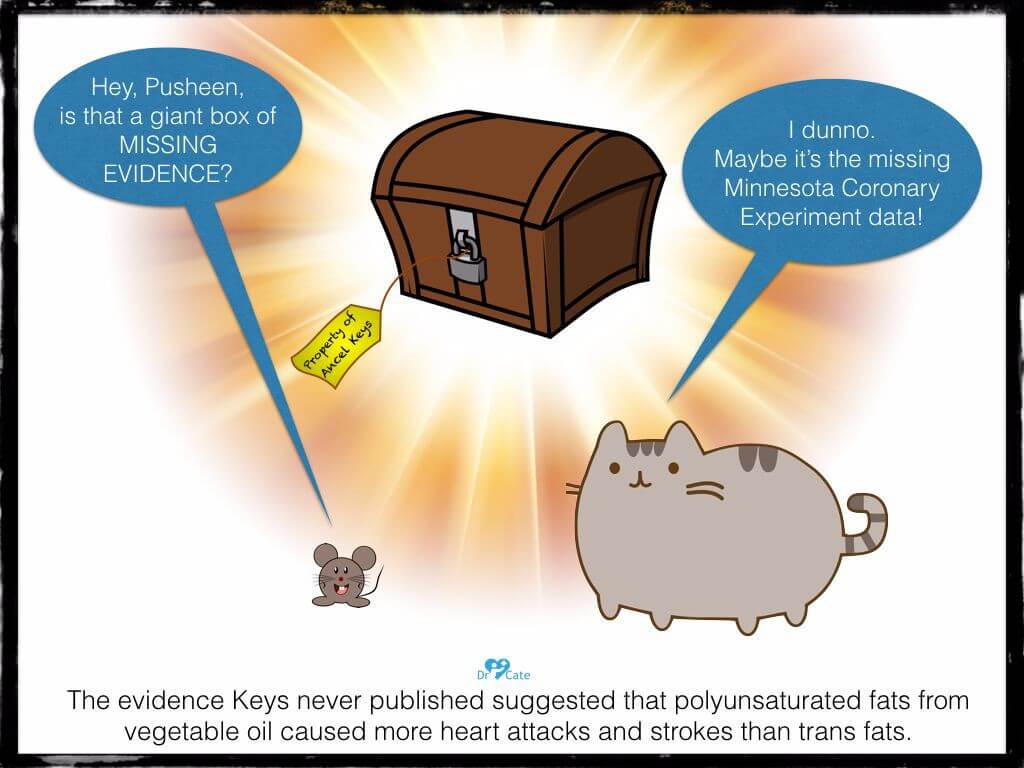

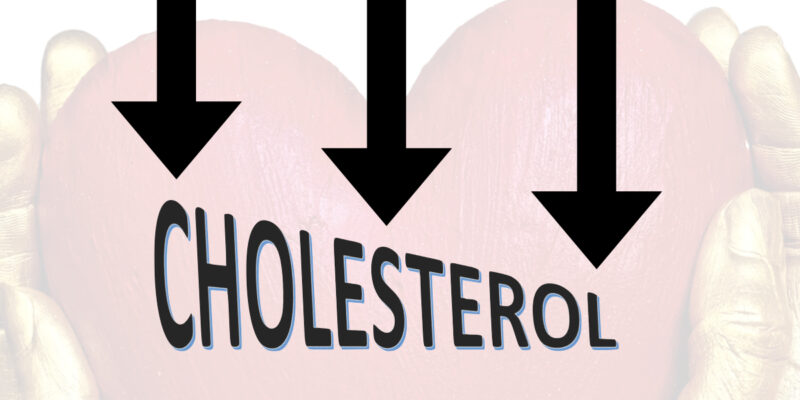
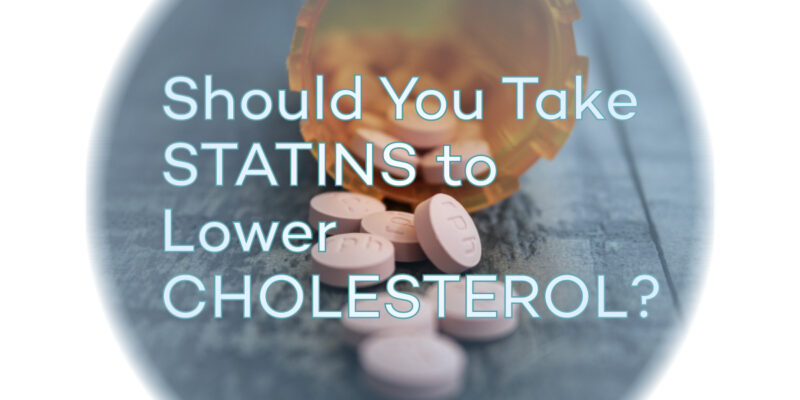

Great stuff. Can’t wait to read part 3. Is there a link to part 3? I don’t see one.
It must have been deleted, thanks for pointing that out. It’s now at the top again.
Willett also says “It’s also important to note that investigators created a special corn
oil margarine that was lower in trans fat than the standard margarine,
but we now know that the most dangerous types of trans fat (18:2 trans
isomers) are likely to be higher in these lightly hydrogenated products
than in the more heavily hydrogenated forms”
Did Ramsden address this?
In his rebuttal to Ramsden, Walter Willett pretty much ignores lower smoking rates as an important factor in heart disease decreases when he says:
“Notably, since the 1960’s, the US diet has changed in this way; intake
of linoleic acid has approximately doubled, and this has corresponded to
a greater than 60 percent decline in coronary heart disease mortality
(3). Although multiple factors have contributed to this decline, none of
the other factors can explain this huge improvement in health, and the
replacement of saturated fat with polyunsaturated fat (both n-6 and n-3
fatty acids) is almost certainly a major, probably most important,
factor. Reversing these changes would almost certainly result in great
harm.”
Of course he doesn’t mention increases in other diseases like diabetes.
I just sent you an email with a few typos on parts 2 and 3
They’re saying today “unsaturated fatty acids are added to hydrogen and changed to saturated fatty acids” this creates saturated fat, and not trans fat. “Previously, the fat was cured incompletely…[by] partial hydrogenation” this creates trans fats.
That is all true.
They did not appear to answer your first question. Only the second.
Your first question is really the most important one, because PUFAs in the oils that are not hydrogenated can be toxic when consumed to excess, which in the USA we now do. And increasingly around the world as well.
Hi Dr Cate
I have read all your books. Which led me to contact the department of health in my country.
– I asked why vegetable oils are allowed in our food?
– There is also a law, that prohibits products containing trans-fat, that are “occurring” while in the process of making the product.
– The answer I got (below), in short: Todays process are changed. Meaning: “Margarine and other hardened fats produced in Norway and many other countries therefore no longer contain trans fats.
– Please Dr. Cate, I am wondering what type of new production process this is, would you happen to know? Or is it just plain lack of knowledge from there part?
The health departments answer:
In the margarine industry, oils are hardened, that means: unsaturated fatty acids are added to hydrogen and changed to saturated fatty acids so that the consistency becomes firmer and rancidity is prevented. Previously, the fat was cured incompletely, which has been shown to lead to the formation of trans fatty acids as a side effect. In a partial hydrogenation, part of the double bonds will be saturated, while part will be converted from cis- to trans-form.
Previously, therefore, margarine could contain significant amounts of trans fat. The processes have now changed. Margarine and other hardened fats produced in Norway and many other countries therefore no longer contain trans fats.
The dietary content of trans fatty acids has decreased in the last thirty years from about 4 to less than one percent of the dietary energy content. It is recommended that the dietary content of trans fatty acids does not exceed 1 energy percent. Today, most of the trans fatty acids in the diet come from dairy and meat products.
By Norwegian law it says: That you cannot sell products, where trans-fat is (“made”)through/by the process. More in detail: “The product cannot contain more than 2 grams of trans fat per 100 grams of fat.
Thank you
A